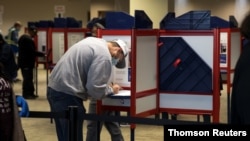Top U.S. intelligence and security officials say the country's adversaries are intensifying their efforts to meddle with the country’s upcoming presidential election, indicating the threat may be changing with less than a month until voters go to the polls.
The dangers, outlined in a video shared on social media by the Federal Bureau of Investigation (FBI) Tuesday, are twofold – influence operations designed to change the way voters think as they fill out their ballots, and heightened attacks on U.S. election infrastructure, something that officials have tried to downplay until now.
“There is no doubt adversaries are trying to undermine our democracy and democratic values as we approach our elections,” said William Evanina, the director of the National Counterintelligence and Security Center (NCSC).
NEW #Election2020 security message from @FBI Dir Christopher Wray, @CYBERCOM_DIRNSA Gen. Nakasone, @CISAKrebs and @ODNIgov Nat'l Counterintelligence & Security Center Dir William Evanina - part of #Protect2020 campaign https://t.co/94jMeksiMB
— Jeff Seldin (@jseldin) October 6, 2020
“The American voter is the primary target,” he added, updating an August 7 statement on election threats. “Foreign actors are spreading disinformation and attempting to sway voters.”
.@FBI's Washington Field Office warning about #Russia|n malign influence operations targeting #Election2020 using #Protect2020
— Jeff Seldin (@jseldin) October 5, 2020
It is at least 2nd time @FBIWFO has sent out this tweet... https://t.co/vWj5ryExBo
But Evanina, the nation’s top counterintelligence official, also warned that foreign adversaries are looking to infiltrate U.S. voting systems.
“They are using an array of cyber activities with the intent to gain access to our election infrastructure,” he said on the video, declining to rule out the possibility that some of those attacks could succeed, if only on a limited basis.
Still, Evanina noted, “It would be very difficult for adversaries to interfere with or manipulate voting results at scale. Our election systems remain resilient.”
The NCSC, when contacted by VOA, declined to elaborate on Evanina’s warning about foreign adversaries – a warning that would seem to contradict elements of previous statements from other top officials, including assurances from FBI Director Christopher Wray.
"We haven't seen cyberattacks to date this year on voter registration databases or on any systems involved in primary voting," Wray told an online forum last month (September).
“To our knowledge, no foreign government has attempted to tamper with U.S. vote counts,” he said.
"We've been fighting the cyber threat for years now & its all too often been a game of whack-a-mole" @FBI Dir Christopher Wray tells @CISAgov Cybersummit
— Jeff Seldin (@jseldin) September 16, 2020
"We investigate one major hack only to uncover another one..."
But a separate threat assessment, shared Tuesday by the Department of Homeland Security, indicated such attacks could be imminent.
"China, Russia and Iran may seek to use cyber capabilities to compromise or disrupt critical infrastructure used to support the 2020 elections," the department said in a statement.
NEW: @DHSgov issues "first-of-its-kind" Homeland Threat Assessment, w/warning about #Election2020:
— Jeff Seldin (@jseldin) October 6, 2020
"#China #Russia & #Iran may seek to use cyber capabilities to compromise or disrupt critical infrastructure used to support the 2020 elections..."
Until now, U.S. officials have blamed the majority of attempts to hack into or take down critical election systems or election-related systems on unnamed cyber actors who appeared to be operating without any direction from adversaries like Russia, China or Iran.
To safeguard against such intrusions, U.S. election officials have installed special sensors to monitor cyber activity, in real time, in all 50 states and across more than 2,500 local jurisdictions.
And as late as last month, those scanners were picking up indications something might have been brewing.
"While we have no evidence of direct targeting of election infrastructure by nation states, we know and continue to see reports of scanning," Matt Masterson, the Department of Homeland Security's senior election security adviser, said during an online event last month.
"What keeps me up at night is, is there something we're not seeing? Is there something we're not tracking?" he said at the time.
Still, other key officials say after four years of security preparations, U.S. voters have little to worry about.
“My confidence in the security of your vote has never been higher,” Christopher Krebs, director of the Cybersecurity and Infrastructure Security Agency, said on the video distributed by the FBI Tuesday.
Krebs, who has previously assured U.S. voters that the upcoming presidential election will be “the most secure election in modern history,” also urged Americans to remain calm, noting that unlike in past years, the outcome of the election may not be known until well after the polls close.
“Because of the changes due to COVID, on November 3, we might not know the outcome of our election, and that’s OK,” he said. “We’re going to need your patience until official votes are announced.”
Due to the pandemic, a record number of Americans are expected to vote by mail. One count, by the U.S. Elections Project, said that as of Tuesday, at least 4.5 million voters had cast their ballots by mail – 50 times more than at the same time in 2016.







